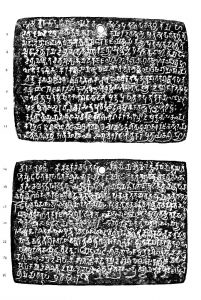
Hail! From Uchchakalpa;—(There was) the Mahârâja Ôghadêva. His son, who meditated on his feet, (was) the MahârâjaKumâradêva, begotten on the Mahâdêvi Kumâradêvi. His son, who meditated on his feet, (was) the Mahârâja Jayasvâmin, begotten on the Mahâdêvi Jayasvâminî. His son, who meditated on his feet, (was) the Mahârâja Vyâghra, begotten on the Mahâdêvi Râmadêvi.
(Line 4.)—His son, who meditates on his feet, the Mahârâja Jayanâtha,— begotten on the Mahâdêvi Ajjhitadêvi,—being in good Health, issues a command to the cultivators, beginning with the Brâhmaṇs, and to the artisans, at (the village of) Dhavashaṇḍikâ:—
(L. 6.)—“Be it known to you that, for the purpose of increasing my own religious merit, (and) for the benefit of the feet of the Divine One, this village is granted by me, as an agranhâra of the god, to continue for the same time with the moon and the sun, to the Divira Sarvavâḍha, of the Śâśâtanêya (gôtra) (?), and his son the Bhâgavata Ganga, and his sons Rankabôta and Ajagaradâsa. And the increase of their own religious merit should be effected by the succession of (their) sons, [sons’ sons*], sons of sons’ sons, sons of the latter, &c., by repairing wathever may become broken or torn, and by attending to the maintenance of the bali,charu, sattra, and other (such rites), of the feet of the Divine One, established here by these persons.
(L. 11.)—“You yourselves shall render to these persons the offering of the tribute of the customary duties, royalties, taxes, gold, &c., and shall be obedient to (their) commands.
(L. 12.)—“And those kings who shall be born in Our lineage,—by them this grant should not be confiscated, (but) should be assented to; (and), with the exception of fines imposed on thieves, the tribute of the taxes which by custom should not belong to the king, should not be taken; and (this grant) should be preserved from time to time.
(L. 14.)—“And whosoever may confiscate this grant,— he shall become invested with (the guilt of) the five great sins and the minor sins.”
(L. 15.)—“And it has been said in the Mahâbhârata by the venerable Vyâsa, the arranger of the Vêdas,— “O Yudhishṭhira, best of kings, carefully preserve land that has been given, whether by thyself or by another; (verily) the preservation (of a grant) (is) more meritorious than making a grant! As a rule, indeed, no inauspicious condition is experienced by kings; but they are purified for ever, when they bestow land! The giver if land enjoys happiness in heaven for sixty thousand years; (but) the confiscator (of a grant), and he who assents (to an act of confiscation), shall dwell for the same number of years in hell! The earth has been enjoyed by many kings, commencing with Sagara; whosoever at any time possesses the earth, to him belongs, at that time, the reward (of this grant that is now made, if he continue it)! He who confiscates land, rich in all (kinds of), grains, (that has been granted),—he becomes a worm in ordure, and sinks (into hell), together with his ancestors!”
(L. 21.)—In a century of years, increased by seventy-seven, on the twenty-second day of the month Chaitra, (this charter) has been written by the Sâmdhivigrahika Gallu, the grandson of the Bhôgika, the Amâtya Phalgudatta, (and) the son of the BhôgikaVaeâhadinna. The Dûtaka (is) the Uparika, Dîkshita, householder, and chief of architects, Śarvadatta.
(L. 23.)—The boundaries in this matter (are),— the direction of Dhânyavâhika, a boundary-trench and a bridge;—in the direction of Durgamaṇḍala, a bridge;—in the direction of Suvarṇakakshaka, (partly) the place where the reeds grow by the cattle-path, and partly a bridge;—in the direction of Âmuka, a boundary-trench;—in the direction of Dâramaṇḍala, a bridge;—(and) in the direction of the district at the entrance of Vakravaṇa, a bridge;—(then the boundaries) enter the village (again) at the well.